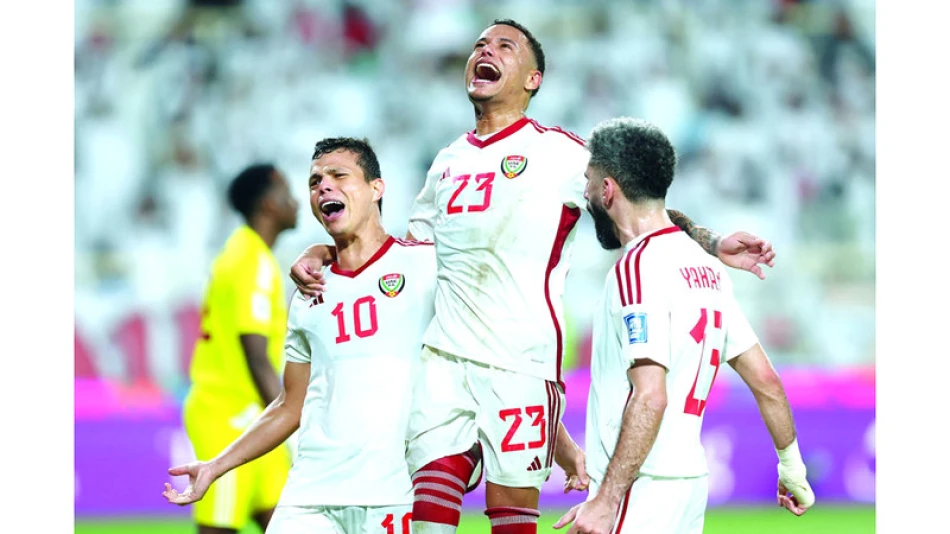
Boosting the Attack: How to Resolve the National Team's Striker Conundrum
UAE National Team Faces Critical Striker Crisis Ahead of 2026 World Cup Qualifiers
The UAE national football team's chronic striker shortage has reached a pivotal moment as Romanian coach Olario Cosmin prepares for crucial World Cup playoff matches against Oman and Qatar in October. With no clear solution to the attacking void, football experts are calling for a complete overhaul of the team's offensive system and tactical approach, potentially determining whether the Emirates can secure their first World Cup appearance since 1990.
The Striker Dilemma: Limited Options Force Creative Solutions
The UAE's attacking crisis has become increasingly apparent throughout recent qualifying campaigns. Sports analysts point to Sharjah forward Caio Lucas as the most viable option to fill the traditional striker role, but only if the entire attacking framework is restructured to support him effectively.
National coach Moataz Abdullah emphasized that Cosmin must rely on the most prepared players available, stating that some previously trusted players "disappointed expectations" during the direct qualification phase. The coach advocates for at least six friendly matches and extended training camps to build chemistry among the squad.
Emerging Talent Overlooked
One notable absence from the current squad is Al Ain's rising striker Mohammed Awad Allah, who recently moved to the Polish league on loan. Football experts believe his fearless approach and natural goal-scoring ability could have provided the solution the team desperately needs. His exclusion highlights the ongoing debate about player selection priorities.
Tactical Adaptation: The "False Nine" Strategy
Former national coach Abdul Majeed Al Nimr suggests the UAE should embrace a "false nine" system, utilizing players like Caio Lucas and Caio Canedo in fluid attacking roles rather than seeking a traditional center-forward. This tactical shift mirrors successful approaches used by Spain during their golden era and current Manchester City under Pep Guardiola.
Al Nimr noted that apart from Al Ahli Youth's Sultan Adel—currently excluded from national team consideration—no genuine striker exists in the domestic league. This reality forces a fundamental rethinking of the team's attacking philosophy.
Regional Competition Analysis
The playoff draw placed the UAE alongside Qatar and Oman in Group 1, creating a challenging but not impossible path to qualification. Former international Nawaf Mubarak observed that the technical levels among these teams are "very close," particularly with Oman, making tactical preparation and team cohesion crucial differentiators.
Qatar's successful 2022 World Cup hosting experience and Oman's recent competitive improvements suggest the UAE cannot rely on regional superiority. The team must maximize their current resources while addressing systemic weaknesses in both attack and defense.
Preparation Timeline and Expectations
The UAE is currently conducting a training camp in Austria until early next month, featuring 29 selected players in the first phase of preparation. A second preparation phase is scheduled for September, providing Cosmin with adequate time to implement tactical changes and assess player combinations.
Defensive Concerns Compound Attacking Issues
Beyond the striker shortage, experts highlight ongoing defensive vulnerabilities that must be addressed simultaneously. The emergence of Al Ahli Youth goalkeeper Hamad Al Maqbali offers one bright spot, with calls for his integration into the national team setup.
Nawaf Mubarak stressed that responsibility lies primarily with the players rather than the coach, noting that recent performances have fallen short of expectations despite the talent available.
The Path Forward: Realistic Expectations
The UAE's World Cup qualification hopes rest on maximizing existing talent rather than discovering miraculous solutions. Cosmin's experience and tactical acumen provide reasons for optimism, but success will require perfect execution of a revised attacking system and significant improvement in team chemistry.
With the October matches approaching rapidly, the Emirates face a defining moment in their football history. The striker crisis that has plagued the team for years must be resolved through collective effort and tactical innovation, as traditional solutions remain unavailable in the domestic player pool.
Most Viewed News

 Sara Khaled
Sara Khaled






